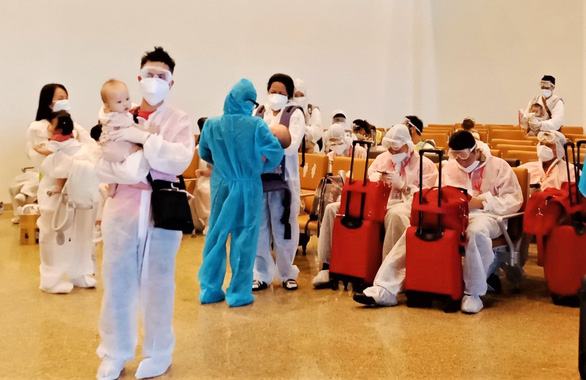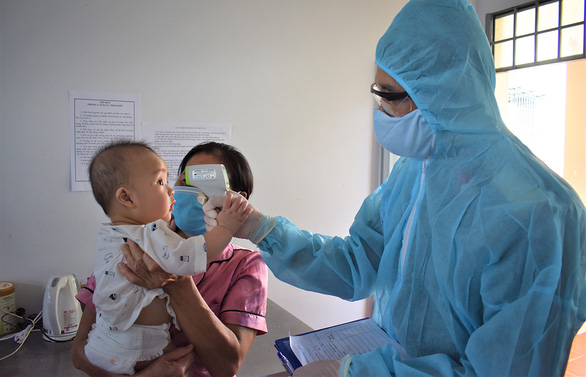 Society
Society


|
| Babies and their companions land at Cam Ranh Airport, Khánh Hòa Province. — Photos tuoitre.vn |
Minh Chiến
KHÁNH HÒA — Late an afternoon of August at Incheon Airport in the Republic of Korea (RoK), a repatriation flight operated by Vietjet Air took off, carrying Vietnamese citizens home.
There have been dozens of similar repatriation flights taking off over the past few months from all corners of the world to rescue Vietnamese nationals from COVID-19 hot spots. But this flight was a special one.
Twenty four passengers on board were babies aged from 18 months to five years old who were heading home without their parents.
Due to difficulties posed by the pandemic, a lot of couples have been forced to send their children home while they stay on in the RoK to complete their labour contracts.
“The biggest difficulty we faced after deciding to send my daughter back to Việt Nam was finding someone who agreed to accompany and take care of her during the flight,” Hoàng Văn Lâm, a Vietnamese labourer working in the RoK, told Tuổi Trẻ (Youth) newspaper.
Lâm was lucky to find Nguyễn Thị Út, a woman hailing from southernmost province of Cà Mau whose labour contract had expired so she was returning to Việt Nam.
When the flight took off, the anxious parents watched as the plane disappeared into the sky, and then spent the next few hours worrying as they waited for confirmation the flight had landed in Việt Nam, Lâm said.
“Four hours later, we [Lâm and his wife] were relieved to see our daughter on the phone with her grandmother after the flight landed at Cam Ranh Airport in central Khánh Hòa Province. It was also the first time my mother had met my baby in person.”
Út, who took care of the baby during the flight, said: “When the flight was taking off, the baby was scared of the loud noise coming from the aircraft's engines. Thanks to the assistance of the aircrew and my experience, she calmed down and it was easier to look after her after that.”
Explaining the reason for sending his daughter home, Lâm said he and his wife had gone to the RoK to work where they had met, got married and had a baby.
“Since the pandemic broke out, our life has changed. We didn’t have time to take care of our baby so we had to send her home. Our labour contracts are still valid. We will try to work and send money home so that our parents can raise her,” Lâm said.
To qualify to send infants home, Vietnamese parents in the RoK have to present the baby’s birth certificate, health check certificate and a document authorising someone else to accompany the baby on a repatriation flight.
Lâm and his wife had to ask for assistance from the Vietnamese Embassy in the RoK and contacted people who were qualified to take the repatriation flights such as Vietnamese workers whose labour contracts had expired and Vietnamese students in the RoK in order to seek help.
“Luckily for like us, many Vietnamese people in the RoK were ready to lend a hand,” Lâm said.
Babies in quarantine camps
After being delivered home to Việt Nam, Lâm's daughter was put in quarantine with her relatives at a military training centre in Khánh Hòa Province.
The military officers had arranged a separate area for the special little citizens. Every room was equipped with kettles, water buckets, wet towels and a separate clothes drying area.
Internet connections were always available so that parents living overseas could call and see their babies every day.
Trần Thị Hồng Nhung from Hà Tĩnh Province, who has been taking care of her nephew at the quarantine site, said the babies had their temperatures measures twice a day. “Thanks to the help of the military officers, my nephew has got used to staying at the camp and no longer cries like he did on the first days.”

|
| A military officer measures the temperature of a baby at the camp. |
Lieutenant Colonel Nguyễn Ánh Dương, the leading military officer at the quarantine camp, said the babies were too young to know how to protect themselves from the pandemic, so health checks were strictly controlled.
“Menus for the babies are carefully prepared with enough nutrition, and the dishes are changed every day. Officers on duty visit each room to remind people it's time to wake up or go to sleep, rather than setting an alarm that would startle the babies.”
Some caregivers at the camp had not met their young charges before, so for them 14 days in quarantine with the babies was a memorable period.
Lê Thị Liên, a caregiver, wanted to take photos of every moment with her grandchild at the camp.
“Flying back home without their parents and being under quarantine during the pandemic are experiences these children should remember. I want to save these moments so when they grow up they will know the world was in the grips of a pandemic, but my grandchild and other people were repatriated by the Government and received care at the quarantine sites,” she said.
Successes from such "special repatriation flight" helped concerned parties to take further efforts to carry out the second flight with 53 kids on board heading home from RoK early this month. — VNS




